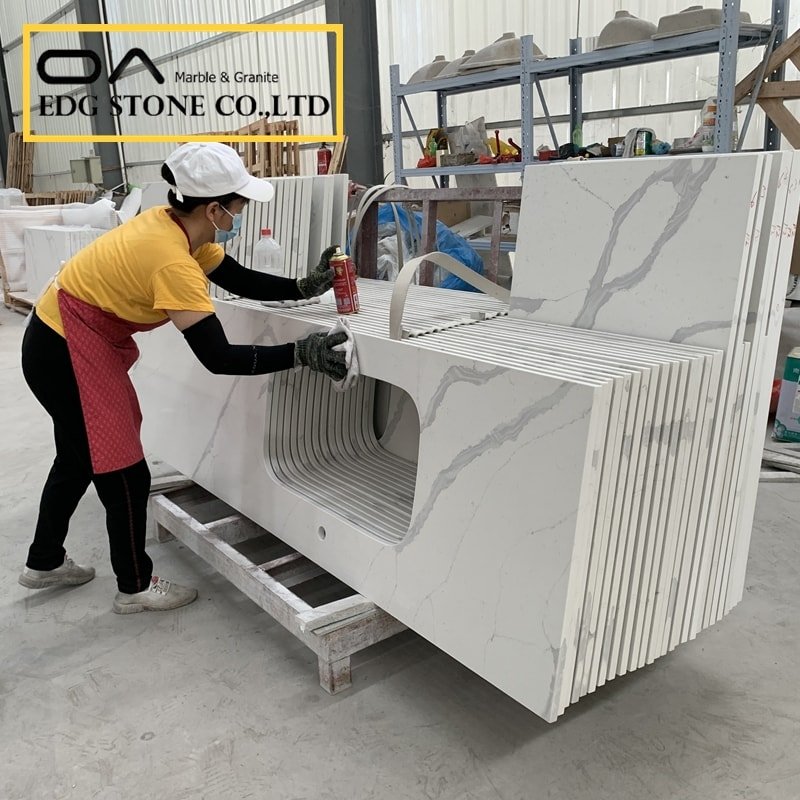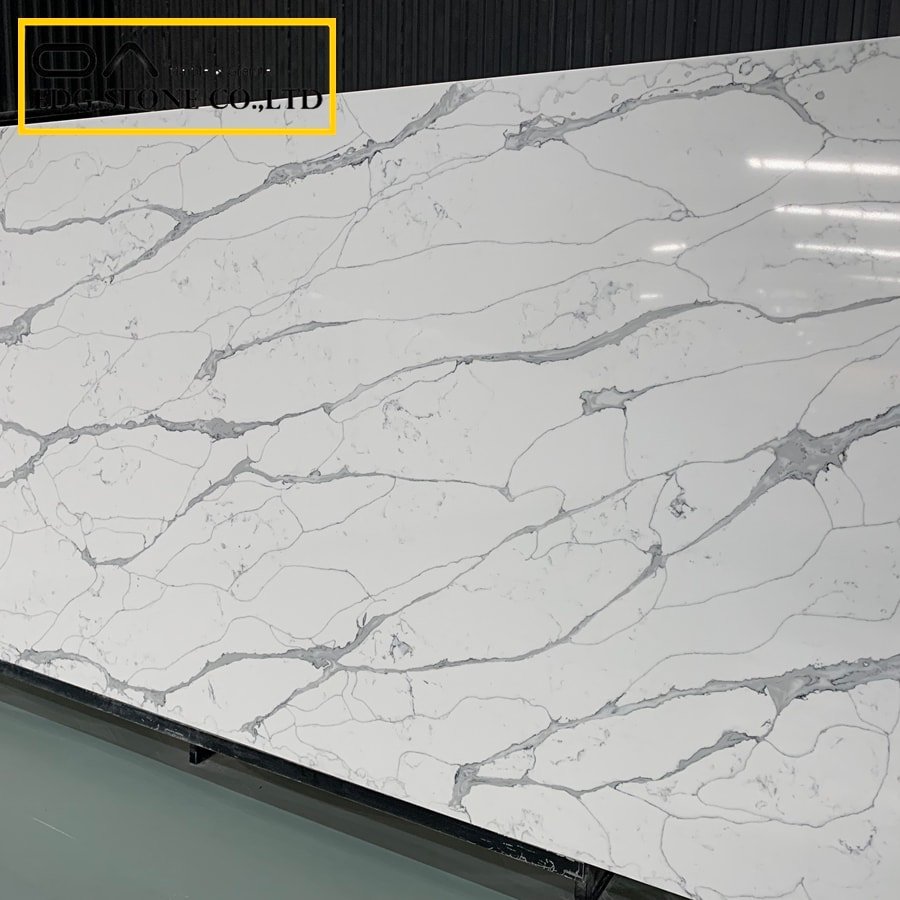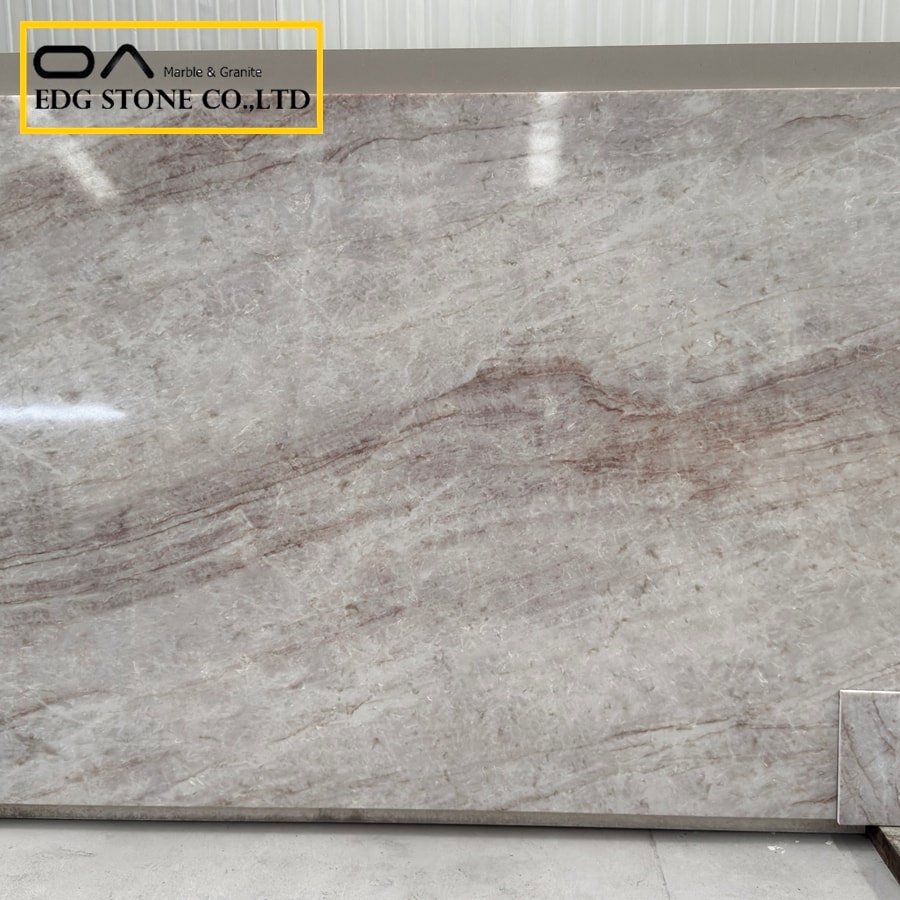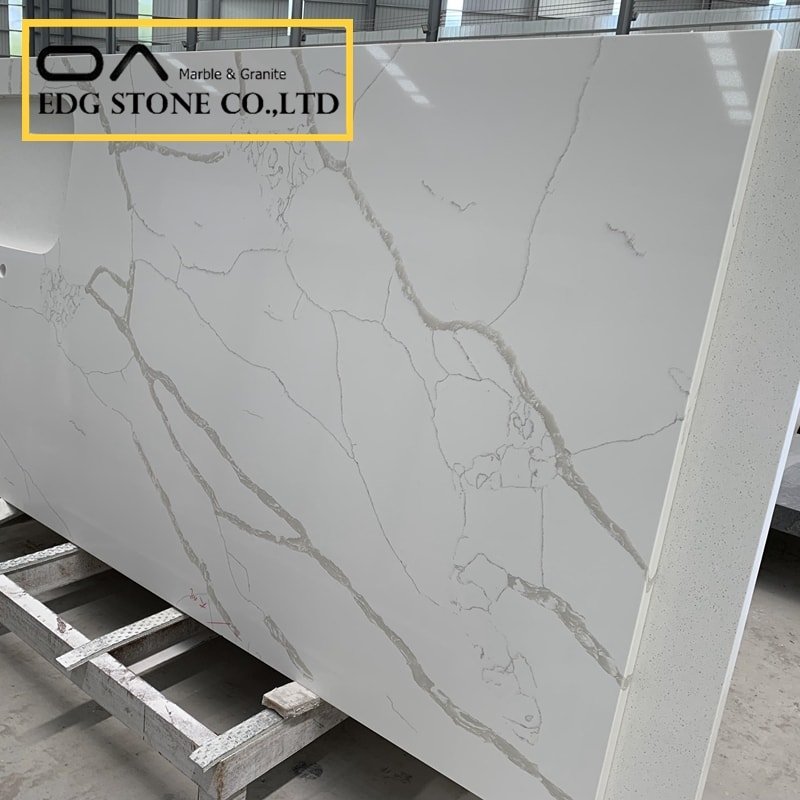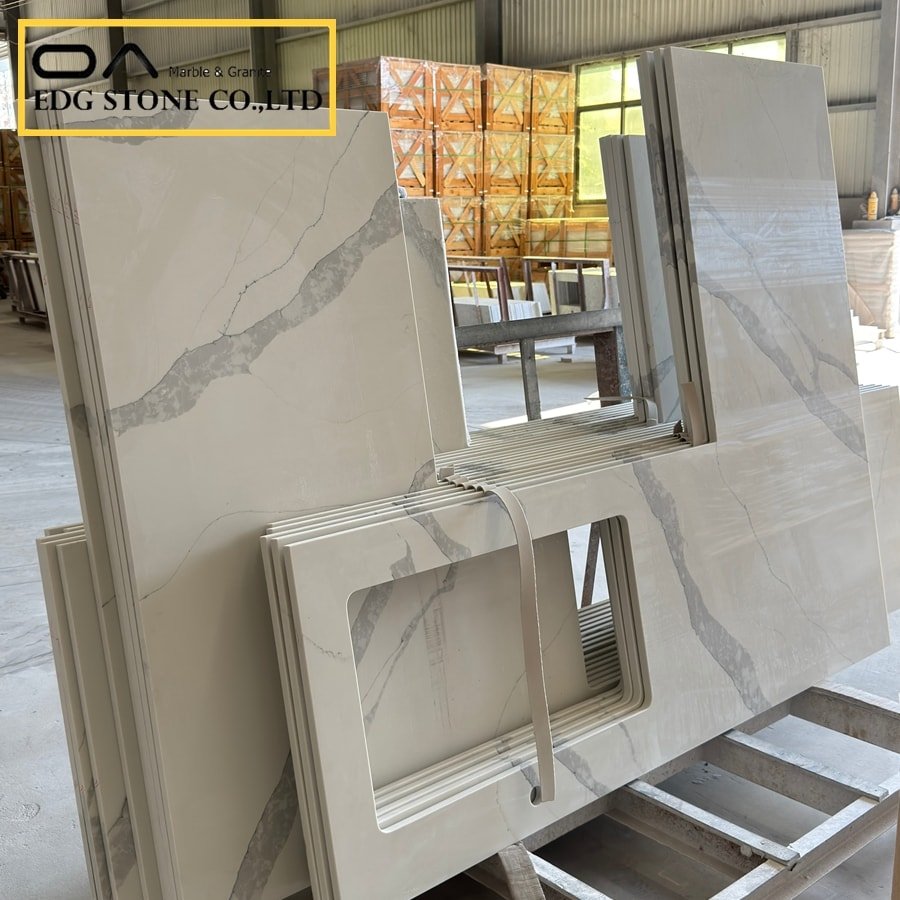How to clean quartz stone
How to Clean Quartz Stone — Full Guide (countertops, raw crystals, stains & polish)?
Quartz is both a popular gem (raw crystals) and a ubiquitous surface (engineered quartz countertops). That dual identity confuses DIY advice: a cleaning method safe for a decorative crystal might damage an engineered countertop finish, and vice versa. This guide separates those two workflows, gives clear step-by-step instructions, lists safe products, explains when to call a pro, and includes industry/regulatory notes so manufacturers, factories, and wholesalers can cite and reuse this content.
Table of contents
-
Quick rules before you start (safety & scope)
-
Everyday cleaning for engineered quartz countertops (manufacturer guidance)
-
Removing common countertop stains (oil, wine, marker, rust, hardened food)
-
Deep cleaning & disinfecting (what’s safe and what to avoid)
-
Restoring shine & light scratch repair (polish, Reglaze, pro help)
-
Cleaning raw quartz crystals collected from the ground (dirt, iron stains, oxalic method)
-
Products recommended by brands and pros (Weiman, StoneTech, Cambria, Caesarstone)
-
Regulatory & industry context (silica issues affecting fabricators/factories)
1) Quick rules before you start (safety & scope)
-
Know what you own. “Quartz” on a countertop usually means engineered quartz (resin + ~90% quartz aggregate). Raw quartz crystals are pure mineral specimens. Cleaning methods differ.
-
Test first. Always test cleaners on a small, inconspicuous area.
-
Avoid abrasive pads (steel wool, green scouring pads) on finished counters — they scratch. Use soft microfiber cloths. Manufacturer guidance recommends soap & water for routine cleaning.
-
Safety for chemical cleaning: when using oxalic acid, muriatic acid, or commercial rust removers for raw specimens, wear gloves, eye protection, and work in a ventilated area — neutralize and dispose per product instructions.
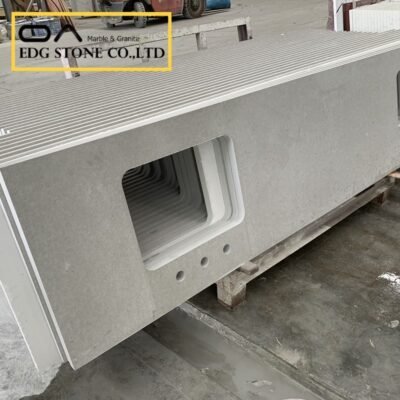
how to clean quartz stone
2) Everyday cleaning for engineered quartz countertops (manufacturer guidance)
Manufacturer consensus is simple and consumer-friendly: warm water, mild dish soap, and a soft cloth. That’s the best daily routine for cleanliness without harming the resin or finish. Brands explicitly state this: Cambria, Caesarstone, and other major quartz makers recommend soap + warm water and gentle drying. For a no-rinse daily spray, many pros use a quartz-specific cleaner (pH-neutral) available from stone-care brands.
Quick daily routine:
-
Wipe spills promptly with a soft cloth or sponge.
-
For routine cleaning: mix a few drops of mild dish soap with warm water; wipe and dry.
-
For a streak-free finish, buff with a dry microfiber towel.
-
For greasy spots, use a neutral stone cleaner or a quartz-specific spray.
3) Removing common countertop stains (practical recipes)
General note: engineered quartz is non-porous and resists stains, but some substances (strong dyes, adhesives, rust particles) require additional steps.
-
Oil/grease: Warm, soapy water and a microfiber cloth. For persistent grease, apply a small amount of isopropyl alcohol (70–90%) on a soft cloth and wipe; rinse and dry.
-
Wine or coffee: Blot, then clean with soap and water. If residue persists, use quartz cleaner or a mild non-abrasive household cleaner, then rinse.
-
Hardened food / dried paint/adhesive: Gently scrape with a plastic putty knife or a razor blade held at a low angle (for polished quartz, many fabricators recommend razor scrapers — use carefully). Follow with a mild cleaner and dry. Test first.
-
Permanent marker: Dab with isopropyl alcohol or a solvent recommended by the manufacturer (e.g., Weiman quartz cleaner or acetone on a cloth — test first). Rinse and dry.
-
Rust/iron stains on quartz countertops: Rust is metal oxide embedded into residue — for engineered quartz, mild rust removers made for stone may help; consult the manufacturer first. For natural stone, poultices or specialized rust removers are used. Always avoid acid on calcareous stones (marble).
4) Deep cleaning & disinfecting — what’s safe and what to avoid
-
Safe disinfectants: Isopropyl alcohol (70%) or a mild bleach solution (diluted bleach) can disinfect surfaces, but manufacturers usually prefer alcohol or a stone-safe disinfectant to avoid potential long-term resin discoloration. If using bleach occasionally, rinse thoroughly and avoid prolonged contact. Cambria and Caesarstone emphasize mild soap and water for daily use and recommend manufacturer-approved products for more aggressive cleaning.
-
What to avoid: Harsh, abrasive cleaners and scouring pads; oven cleaners, drain openers, straight acids (muriatic), and high-pH industrial degreasers unless the manufacturer says otherwise — these can dull or damage the resin and surface. Also, avoid prolonged contact with hot pots (use trivets).
5) Restoring shine & light scratch repair
-
Light haze or minor scratches: commercial quartz polishers (some StoneTech/Weiman products) or non-abrasive polishing compounds can help. Use polishing pads with gradual grit progression if you have experience.
-
Deeper scratches or chips: color-matched epoxy fills and professional resin repair from a stone restoration company are recommended. For engineered quartz, many major brands recommend calling a professional fabricator for significant repairs to match gloss and color.
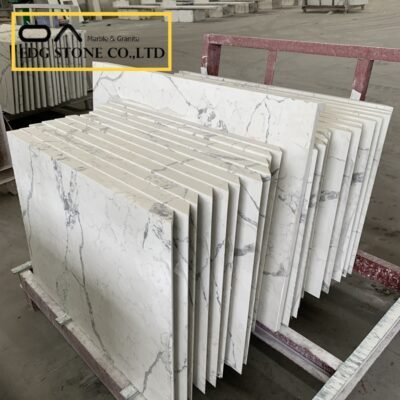
how to clean quartz crystals from the ground
6) Cleaning raw quartz crystals collected from the ground (collector methods)
If you’re a rockhound or gem collector, you’ll need a different approach:
Step A — Remove dirt and clay
-
Rinse with water and gently scrub with a soft brush. For heavy mud, soak in water to soften the matrix before brushing.
Step B — Remove iron (rust) stains
-
Oxalic acid soak is a standard method used by mineral collectors to remove iron staining. Prepare according to product instructions (and with PPE). Soak until stains lighten, then neutralize (baking soda) and rinse thoroughly. Oxalic acid is effective because it chelates iron. Mindat and rockhounding guides describe oxalic acid or Iron-Out solutions as common approaches.
Step C — When calcite/limestone coatings persist
-
Gentle acetic acid (vinegar) can remove surface calcite deposits; muriatic (hydrochloric) acid will remove heavier carbonate coatings but is hazardous and should be used only by experienced users with appropriate PPE and disposal practices. Always neutralize acid baths and follow local disposal rules.
Safety note for collectors: acids used to clean specimens are hazardous — use gloves, eye protection, work outdoors or in a fume hood, and neutralize/neutralize before disposal. For large or valuable specimens, consult a mineral conservator.
7) Products recommended by brands and pros
-
Weiman Quartz Clean & Shine — product marketed specifically for engineered quartz; pH-neutral and formulated to avoid streaking. Good for daily shine.
-
StoneTech (Laticrete) Quartz & Tile Cleaner / Revitalizer — used by professionals for daily cleaning and surface revitalization.
-
Manufacturer guidance (Cambria, Caesarstone, Silestone, etc.) — emphasize mild soap/water; reserve specialty cleaners for stubborn spots and follow brand guidance for warranty compliance.
If you operate a manufacturer or factory selling engineered quartz, consider selling or recommending an approved daily cleaner bundle with your slabs — it’s a small value-add that builds trust with contractors and end customers.
8) Regulatory & industry context (why this matters for fabricators & factories)
While cleaning countertops rarely produces silica dust, fabrication, cutting, and polishing do — and industry-wide concern over engineered stone and silicosis is reshaping regulations and buyer requirements. A 2023 JAMA Internal Medicine case series described severe silicosis in engineered stone fabricators in California; regulators and OSHA/NIOSH emphasize wet methods, HEPA control, and written exposure plans for shops and installers. If you’re a factory or manufacturer selling engineered quartz, buyers increasingly ask for: documented exposure controls, shop safety procedures, and compliant fabrication certifications.
OSHA’s silica standard and NIOSH guidance remain relevant to fabricators and installers; while household cleaning is low-risk, any on-site grinding or repair that generates dust must use wet/HEPA controls and appropriate respiratory protection.
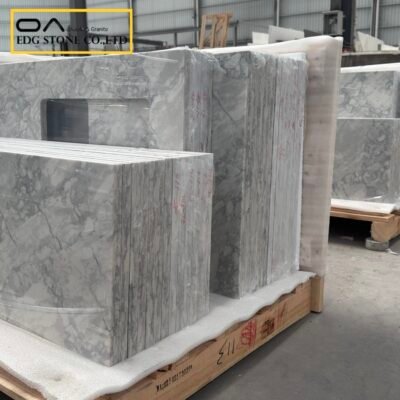
quartz stone countertop
9) Troubleshooting quick table (what to do, one line)
-
Sticky residue → warm soapy water + plastic scraper.
-
Hard adhesive → gentle solvent (acetone) on cloth, test first.
-
Rust on specimen → oxalic acid soak (collector) or professional rust remover (countertop: consult fabricator).
-
Etching/haze on marble-like surfaces → professional honing (not typical for engineered quartz).
-
Persistent odors → isopropyl alcohol wipe + rinse.
FAQ — Top Google search questions (5 items)
Below are 5 high-value FAQs. The text below (visible Q&A) is identical to the JSON-LD schema block immediately following it — so search engines can surface your exact content as a rich result.
Q1: What is the best cleaner for quartz countertops?
A1: For daily cleaning, warm water and a mild dish soap are the best and safest option (preferred by major manufacturers). For a spray cleaner, use a pH-neutral, quartz-specific product like Weiman Quartz Clean & Shine or a StoneTech quartz cleaner for no-rinse convenience. Always test and follow your quartz manufacturer’s recommendations.
Q2: Can I use vinegar or bleach on quartz countertops?
A2: Avoid frequent or prolonged use of vinegar (acetic acid) or undiluted bleach on engineered quartz. Occasionally, carefully rinsed use may be okay, but manufacturers recommend mild soap/water or approved stone cleaners to preserve resin and finish. For disinfection, isopropyl alcohol is often recommended.
Q3: How do I remove rust stains from quartz countertops?
A3: For engineered quartz, consult your fabricator/manufacturer first; many mild rust removers or stone-safe products work. For natural stone or collectible specimens, oxalic acid or specialty rust-removal poultices (used by collectors) can remove iron staining — used with PPE and proper neutralization.
Q4: How do you clean raw quartz crystals from the ground?
A4: Start with warm water and a soft brush to remove dirt. For iron (rust) stains, use an oxalic acid soak or commercial Iron-Out per instructions, neutralize, and rinse. For calcite coatings, short vinegar soaks or professional acid baths (muriatic) may work, but acids require caution and proper disposal.
Q5: How do you remove permanent marker or superglue from quartz countertops?
A5: Dab isopropyl alcohol for marker; for cured superglue, acetone on a cloth (test first), and gentle scraping with a plastic blade usually removes residue. Rinse and dry; avoid pouring solvents onto the surface.
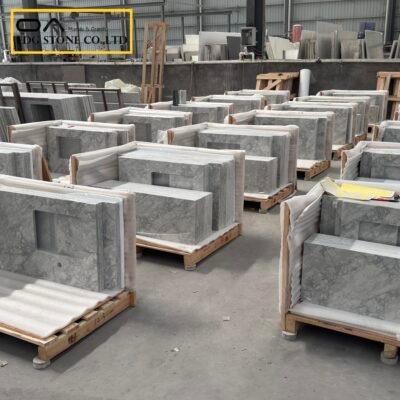
best cleaner for quartz countertops
Semantic Close: How / Why / What / Options / Considerations
Why: Engineered quartz contains resin binders sensitive to harsh chemicals and abrasion; following manufacturer guidance preserves warranty and finish. For collectors, proper chemical cleaning removes iron and calcite without damaging the crystal.
What: Use mild soap/water, isopropyl alcohol for marker, acetone sparingly for adhesives, oxalic acid for iron stains on specimens, and quartz-specific spray cleaners for streak-free maintenance. Avoid abrasive pads, undiluted acids, and repeated bleach use.
Options: DIY daily care (soap + water) | Buy manufacturer-approved cleaner (Weiman, StoneTech) | Hire professional stone restoration for deep polishing or large repairs | For collectors, chemical soaks (oxalic/muriatic) under controlled conditions.
Considerations: If you manufacture or sell quartz surfaces, include cleaning care instructions and an approved cleaner in your handoff package — buyers increasingly expect documented care to protect the warranty and avoid premature returns. Also, industry health concerns over silica (fabrication) do not change daily cleaning needs but do tighten shop controls and buyer expectations.
3–5 long-tail / purchase-intent keywords:
best quartz cleaner for countertops manufacturer recommended
quartz countertop cleaner wholesale for fabricators and installers
How to clean raw quartz crystals from ground for collectors
best quartz cleaner and polish for engineered quartz countertops
quartz care and maintenance guide for factories & homeowners
50 SEO tags (comma separated):
clean quartz stone, how to clean quartz stone, quartz cleaner, how to clean quartz crystals from the ground, quartz stone countertop, best cleaner for quartz countertops, best quartz cleaner, best quartz cleaner and polish, quartz care and maintenance, quartz countertop cleaner, how to clean raw crystals at home, how to clean quartz countertops, remove rust from quartz, remove oil from quartz countertop, remove permanent marker from quartz, how to disinfect quartz countertop, Weiman quartz cleaner, StoneTech quartz cleaner, Cambria quartz cleaning, Caesarstone cleaning guide, quartz cleaning tips, how to polish quartz countertop, quartz scratch repair, clean engineered quartz, cleaning quartz slabs factory, quartz cleaner manufacturer, quartz cleaner wholesale, quartz cleaning product, oxalic acid clean quartz crystals, iron out quartz crystals, cleaning quartz specimens, how to remove stains from quartz, quartz countertop maintenance, quartz safe cleaners, best way to clean quartz, daily care for quartz countertops, remove adhesive from quartz, clean quartz mineral, buyer guide quartz care, reseller quartz maintenance, quartz cleaning SEO, quartz cleaning guide 2025, quartz cleaning FAQ, quartz cleaning for builders, quartz cleaning for manufacturers, quartz cleaning for kitchens, quartz sanitizing tips, quartz cleaning chemicals, safe cleaners for quartz.


